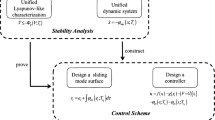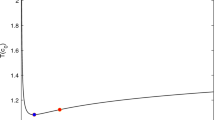Abstract
This paper is concerned with the problem of generalized \(H_2\) filter design for static neural networks with time-varying delay. A double-integral inequality and the reciprocally convex combination technique are employed to handle the cross terms appeared in the time-derivative of the Lyapunov functional. An improved delay-dependent design criterion is presented by means of linear matrix inequalities. It is shown that the gain matrix of the desired filter and the optimal performance index are simultaneously achieved by solving a convex optimization problem. Moreover, the upper bound of the exponential decay rate of the filtering error system can be also easily obtained. An example with simulation is exploited to illustrate the effectiveness of the developed result.

Similar content being viewed by others
References
Xu ZB, Qiao H, Peng J, Zhang B (2004) A comparative study of two modeling approaches in neural networks. Neural Netw 17:73–85
Du B, Lam J (2009) Stability analysis of static recurrent neural networks using delay-partitioning and projection. Neural Netw 22:343–347
Li P, Cao J (2006) Stability in static delayed neural networks: a nonlinear measure approach. Neurocomputing 69:1776–1781
Li X, Gao H, Yu X (2011) A unified approach to the stability of generalized static neural networks with linear fractional uncertainties and delays. IEEE Trans Syst Man Cybern B 41:1275–1286
Liao X, Luo Q, Zeng Z, Guo Y (2008) Global exponential stability in Lagrange sense for recurrent neural networks with time delays. Nonlinear Anal RWA 9:1535–1557
Shao H (2010) Less conservative delay-dependent stability criteria for neural networks with time-varying delays. Neurocomputing 73:1528–1532
Wu ZG, Lam J, Su H, Chu J (2012) Stability and dissipativity analysis of static neural networks with time delay. IEEE Trans Neural Netw Learn Syst 23:199–210
Zhang XM, Han QL (2011) Global asymptotic stability for a class of generalized neural networks with interval time-varying delays. IEEE Trans Neural Netw 22:1180–1192
Zeng Z, Huang DS, Wang Z (2005) Global stability of a general class of discrete-time recurrent neural networks. Neural Process Lett 22:33–47
Ozcan N (2011) A new sufficient condition for global robust stability of delayed neural networks. Neural Process Lett 34:305–316
Faydasicok O, Arik S (2013) A new upper bound for the norm of interval matrices with application to robust stability analysis of delayed neural networks. Neural Netw 44:64–71
Edwards PJ, Murray AF (1998) Fault tolerance via weight noise in analog VLSI implementations of MLPsA case study with EPSILON. IEEE Trans Circuits Syst II 45:1255C1262
Huang H, Feng G (2009) Delay-dependent \(H_\infty \) and generalized \(H_2\) filtering for delayed neural networks. IEEE Trans Circuits Syst I 56:846–857
Wang Z, Ho DWC, Liu X (2005) State estimation for delayed neural networks. IEEE Trans Neural Netw 16:279–284
Boyd S, EI Ghaoui L, Feron E, Balakrishnan V (1994) Linear matrix inequalities in system and control theory. SIAM, Philadelphia
He Y, Wang QG, Wu M, Lin C (2006) Delay-dependent state estimation for delayed neural networks. IEEE Trans Neural Netw 17:1077–1081
Liu X, Cao J (2010) Robust state estimation for neural networks with discontinuous activations. IEEE Trans Syst Man Cyber B 40:1425–1437
Li T, Fei S, Zhu Q (2009) Design of exponential state estimator for neural networks with distributed delays. Nonlinear Anal RWA 10:1229–1242
Wang Z, Liu Y, Liu X (2009) State estimation for jumping recurrent neural networks with discrete and distributed delays. Neural Netw 22:41–48
Zhang D, Yu L, Wang QG, Ong CJ (2012) Estimator design for discrete-time switched neural networks with asynchronous switching and time-varying delay. IEEE Trans Neural Netw Learn Syst 23:827–834
Liu Y, Wang Z, Liu X (2012) State estimation for discrete-time neural networks with Markov-mode-dependent lower and upper bounds on the distributed delays. Neural Process Lett 36:1–19
Tseng KH, Tsai JSH, Lu CY (2012) Design of delay-dependent exponential estimator for T-S fuzzy neural networks with mixed time-varying interval delays using hybrid Taguchi-Genetic algorithm. Neural Process Lett 36:49–67
Huang H, Feng G, Cao J (2011) Guaranteed performance state estimation of static neural networks with time-varying delay. Neurocomputing 74:606–616
Huang H, Feng G, Cao J (2010) State estimation for static neural networks with time-varying delay. Neural Netw 23:1202–1207
Ariba Y, Gouaisbaut F (2007) Delay-dependent stability analysis of linear systems with time-varying delay, in 46th IEEE Conference on Decision and Control, New Orleans, LA, UAS, pp. 2053–2058
Zhang XM, Han QL (2008) Robust \(H_\infty \) filtering for a class of uncertain linear systems with time-varying delay. Automatica 44:157–166
Sun J, Liu GP, Chen J, Rees D (2010) Improved delay-range-dependent stability criteria for linear sytems with time-varying delays. Automatica 46:466–470
Park P, Ko JW, Jeong C (2011) Reciprocally convex approach to stability of systems with time-varying delays. Automatica 47:235–238
Acknowledgments
The authors would like to thank the anonymous reviewers for their constructive comments that have greatly improved the quality of this paper. The work was partially supported by the National Natural Science Foundation of China under Grant No. 61005047, and the Natural Science Foundation of Jiangsu Province of China under Grant No. BK2010214. Also, this publication was made possible by NPRP grant #4-1162-1-181 from the Qatar National Research Fund (a member of Qatar Foundation). The statements made herein are solely the responsibility of Tingwen Huang.
Author information
Authors and Affiliations
Corresponding author
Appendix A: Proof of Lemma 1
Appendix A: Proof of Lemma 1
Let \(\mathcal {T}_N=\left[ \begin{array}{c@{\quad }c} I&{}0\\ -T^{-1}N&{}I \end{array} \right] \). It is known that
resulting from
Then, one has
That is, (7) holds. This completes the proof. \(\square \)
Rights and permissions
About this article
Cite this article
Huang, H., Huang, T. & Chen, X. Exponential Generalized \(H_2\) Filtering of Delayed Static Neural Networks. Neural Process Lett 41, 407–419 (2015). https://doi.org/10.1007/s11063-014-9347-8
Published:
Issue Date:
DOI: https://doi.org/10.1007/s11063-014-9347-8




